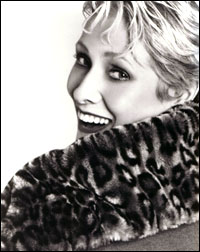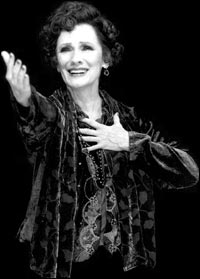

by Bruce Janiga
 |
|
How did you come to play in Gypsy?
Well I had heard about the project for a while and people made inquiries as to whether I was interested and of course
I was interested and really wanted to do it. And at the last minute they came to me.
So you had wanted to do this for a while?
Yes. Whenever people asked what role I wanted to do - it was always Rose in Gypsy.
What did you do to prepare for the role?
My first exposure to Gypsy was when I was fifteen. I played Dainty June at a regional theater in Fort Worth,
Texas called Casa Maqana. I remember watching our Mama Rose every night and thinking, I'll play this part someday.
I just set my cap towards it at that point. It was six years ago that I did it at the Southern Arizona Light
Opera Company. We learned it in two weeks and I did about eight performances. It was really short and I didn't really
feel I did it very well. And I also felt that I was too young for it at that point. I know age is really relative
and I was old enough chronologically but I didn't feel that I was mature enough to do it properly.
This time around I felt that I had the maturity to play the part. I had a different kind of take on it than when I did it six years ago. I knew better how to do it.
What does that mean? Did you know Rose better?
I just had more knowledge in every way, more security. In six years I had grown that much and I knew better what I
was doing and how to do it. There's no comparison. It is quite extraordinary that one can grow that much in six years.
Also, I had done Sunset Boulevard in between and that was a great growth experience for me.
I don't know whether you read reviews or not...
I always read reviews.
The New York Times was glowing.
Yes, it was really nice.
They called you the Mama Rose of the century.
All the reviews were just wonderful. It was a complete gift. I owe all those guys flowers.
Does that energize you for your performance?
Well it's better than having them say they didn't like it. It's very wonderful to have what you're trying to do
be acknowledged.
 Joan Marcus |
|
|
Betty Buckley in Paper Mill's Gypsy
|
I don't think I could ever feel more pressure than I did in Sunset Boulevard. That was one of the most stressful experiences I've had: to come, in in two situations, to replace somebody in London in such a controversial way, and then to replace somebody with the persona that Glenn Close has was really very tough. It was a tremendous exercise for me to stay really centered and focused and do my work and let the results go and hope that people would see it and appreciate it, and see its value. Fortunately for me they did. It could have so easily gone the other way, but fortunately the critics embraced my work and so did the audience and that was hugely gratifying. The acknowledgement of that, the affirmation of things that I had felt about my own commitment to my work for many years, the studying I had done and the practice, really paid off in that situation. So that kind of acknowledgement can't help but make you feel endorsed for all the hard work you've put in. So after that I felt ready to take on Gypsy and I felt that I had something individual to say in the role. Having never seen Merman, I can only get an impression of her. And I'm quite a fan of Angela Lansbury. She's one of our great ladies of the Musical Theater.
But I have my own feelings about ladies as legendary as Ethel Merman and Mary Martin. In those days I was a child. People compared me to them; I was "this little Ethel Merman" because I had this big voice. I had very strong feelings about being a musician and wanting to be very musical. And I never felt that I was an Ethel Merman. I appreciated what she did but I never felt that that was what I was as a singer, nor as a performer. I had seen her in films and she was very unique, but I always felt that I was different than that.
There are interpretations or roles that I feel, "Well, there's nothing else to say here." But there are parts that I look at and say, "That's really nice. That's interesting, that lady's interpretation, but I can also see it in this way." And when I think I have something specific to offer I want to try, and it's not that I'm in competition or should even be compared to other actresses. It's just a different interpretation.
I think Gypsy is one of the two greatest musicals in the collection of American Musical Theater along with West Side Story. And they happened to be the first two musicals I got to do when I was fifteen that summer. I was Dainty June in Gypsy and I played Baby John's Girl in West Side Story. I can sing the entire score of West Side Story; I can sing every single character. But there's no part for me. Once at a dinner party I sang it; it was a spontaneous experience. I sang the whole West Side Story score. So those were the two great musicals that I've loved from my youth and I've always wanted to do.
So now my life has brought me to a certain point of psychological awareness from the studies I've done and I felt it was alright to reinterpret Mama Rose so I did.
Would you talk just a bit about how you see your reinterpretation of her character?
That's so hard to put into words. I don't think there are any such things as "monsters". I think it's my job as an actress if I play a person who behaves "monstrously" to illuminate the person's humanity and bring psychological perspective as to why they behave monstrously. I feel that's my job as an actor and a storyteller. But of course Mama Rose is one of the great sacred monsters in musical theater.
At my Carnegie hall Concert in 1996 for Broadway Cares/Equity Fights AIDS, I did a section called "the Sacred Monsters". I did it back to back, changing the costume on stage in front of the audience , Norma Desmond then Margaret White in Carrie and I ended with Rose doing "Rose's Turn". I think "Rose's Turn" is one of the greatest character songs ever written. The moment contains a kind of a nervous breakdown. It is remarkably structured. It's remarkable writing. I can't believe that Sondheim wrote that when he was so young. Sondheim is like... I'm such a complete devotee. I hold him in such high esteem. I think that what he writes is beautiful. What's startling is what he wrote at such a young age. It's remarkable what he knows about people and character. His capacity to write a character's dilemma, what I call a monologue song, when the character comes forward and proposes a dilemma before the audience and then consciously works through the alternatives and arrives at a new perspective by the end experientially so that it is an actual visceral experience that the storyteller or the character goes through; no one writes that better than he does.
I remember when I was in Into the Woods... ››
“Assassins is about how society interprets the American Dream, marginalizes outsiders and rewrites and sanitizes its collective history. "Something Just Broke" is a major distraction and plays like an afterthought, shoe horned simply to appease. The song breaks the dramatic fluidity and obstructs the overall pacing and climactic arc which derails the very intent and momentum that makes this work so compelling...”
- Mark Bakalor
“I found [the Sondheim Celebration's Company] to be completely delightful. Almost all of the numbers excited and energized me, and most of the scenes were about as pitch-perfect as you can get. I just sat there with a big smile on my face the whole show.
Which is not to say that it is perfect...”
- popcornonmyknees
Explore the rest of the Finishing the Chat Community Forum
|
|
CD: $13.99
DVD: $25.49
VHS: $19.98
|
|
Browse additional merchandise...